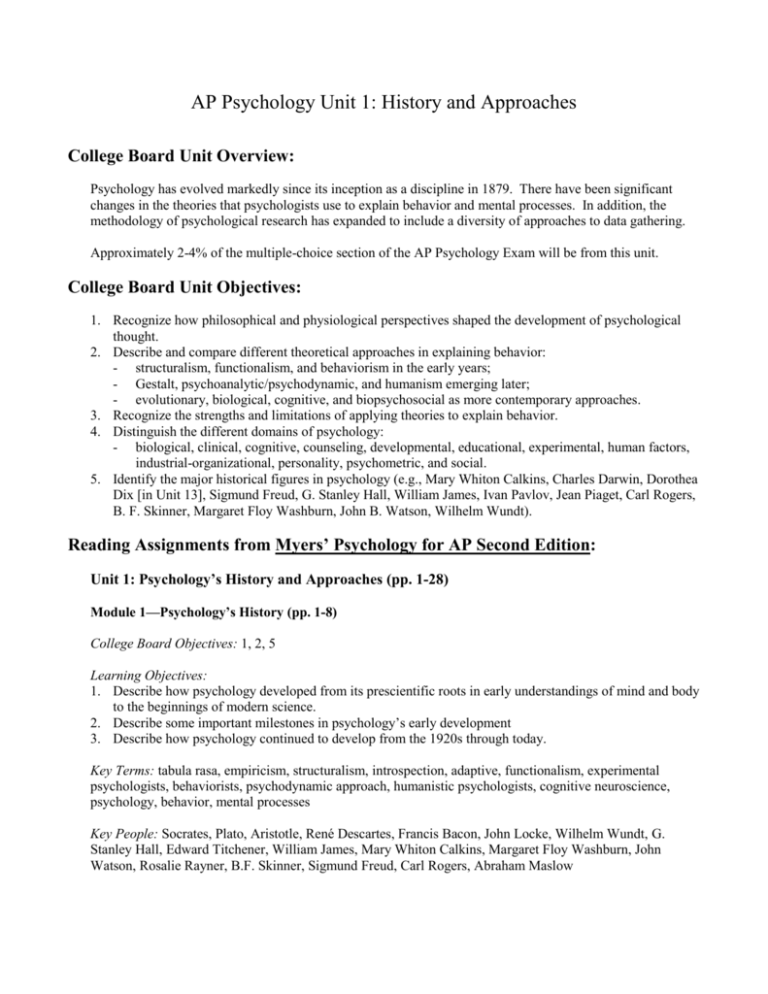AP Psychology Unit 1: History, Approaches, and Research Methods
advertisement

AP Psychology Unit 1: History and Approaches College Board Unit Overview: Psychology has evolved markedly since its inception as a discipline in 1879. There have been significant changes in the theories that psychologists use to explain behavior and mental processes. In addition, the methodology of psychological research has expanded to include a diversity of approaches to data gathering. Approximately 2-4% of the multiple-choice section of the AP Psychology Exam will be from this unit. College Board Unit Objectives: 1. Recognize how philosophical and physiological perspectives shaped the development of psychological thought. 2. Describe and compare different theoretical approaches in explaining behavior: - structuralism, functionalism, and behaviorism in the early years; - Gestalt, psychoanalytic/psychodynamic, and humanism emerging later; - evolutionary, biological, cognitive, and biopsychosocial as more contemporary approaches. 3. Recognize the strengths and limitations of applying theories to explain behavior. 4. Distinguish the different domains of psychology: - biological, clinical, cognitive, counseling, developmental, educational, experimental, human factors, industrial-organizational, personality, psychometric, and social. 5. Identify the major historical figures in psychology (e.g., Mary Whiton Calkins, Charles Darwin, Dorothea Dix [in Unit 13], Sigmund Freud, G. Stanley Hall, William James, Ivan Pavlov, Jean Piaget, Carl Rogers, B. F. Skinner, Margaret Floy Washburn, John B. Watson, Wilhelm Wundt). Reading Assignments from Myers’ Psychology for AP Second Edition: Unit 1: Psychology’s History and Approaches (pp. 1-28) Module 1—Psychology’s History (pp. 1-8) College Board Objectives: 1, 2, 5 Learning Objectives: 1. Describe how psychology developed from its prescientific roots in early understandings of mind and body to the beginnings of modern science. 2. Describe some important milestones in psychology’s early development 3. Describe how psychology continued to develop from the 1920s through today. Key Terms: tabula rasa, empiricism, structuralism, introspection, adaptive, functionalism, experimental psychologists, behaviorists, psychodynamic approach, humanistic psychologists, cognitive neuroscience, psychology, behavior, mental processes Key People: Socrates, Plato, Aristotle, René Descartes, Francis Bacon, John Locke, Wilhelm Wundt, G. Stanley Hall, Edward Titchener, William James, Mary Whiton Calkins, Margaret Floy Washburn, John Watson, Rosalie Rayner, B.F. Skinner, Sigmund Freud, Carl Rogers, Abraham Maslow Module 2—Psychology’s Big Issues and Approaches (pp. 9-19) College Board Objectives: 3, 4, 5 Learning Objectives: 4. Summarize the nature-nurture debate in psychology. 5. Describe psychology’s three main levels of analysis and related perspectives. 6. Identify psychology’s main subfields. 7. Explain how psychological principles can help you learn and remember, and do better on the AP exam. Key Terms: nature-nurture issue, natural selection, levels of analysis, biopsychosocial approach, behavioral psychology, biological psychology, cognitive psychology, evolutionary psychology, psychodynamic psychology, social-cultural psychology, psychometrics, basic research, developmental psychology, educational psychology, personality psychology, social psychology, applied research, industrialorganizational psychology, human factors psychology, counseling psychology, clinical psychology, psychiatry, positive psychology, community psychologists, testing effect, SQ3R Key People: Ivan Pavlov, Jean Piaget, Charles Darwin, Dorothea Dix, Martin Seligman Module 3—Careers in Psychology (pp. 20-25) College Board Objective: 4 Learning Objective: 8. Describe what psychologist in various professions do and where they work. PowerPoint Presentations Unit 1, Module 1: Psychology’s History College Board Objectives: 1, 2, 5 Additional Terms and People: consciousness, Max Wertheimer, cognition Unit 1, Modules 2 and 3: Psychology’s Big Issues and Approaches and Careers in Psychology College Board Objectives: 2, 3, 4




